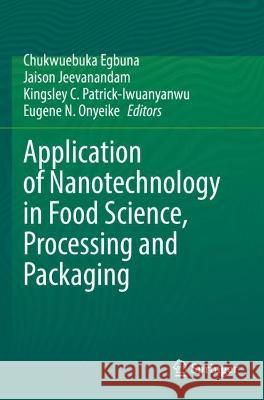Application of Nanotechnology in Food Science, Processing and Packaging » książka
topmenu
Application of Nanotechnology in Food Science, Processing and Packaging
ISBN-13: 9783030988227 / Angielski / Miękka / 2023
Application of Nanotechnology in Food Science, Processing and Packaging
ISBN-13: 9783030988227 / Angielski / Miękka / 2023
cena 724,58
(netto: 690,08 VAT: 5%)
Najniższa cena z 30 dni: 693,97
(netto: 690,08 VAT: 5%)
Najniższa cena z 30 dni: 693,97
Termin realizacji zamówienia:
ok. 16-18 dni roboczych.
ok. 16-18 dni roboczych.
Darmowa dostawa!
This book entitled ‘Application of Nanotechnology in Food Science, Processing and Packaging’ presents up-to-date information on the emerging roles of nanotechnology in food industry, its fundamental concepts, techniques and applications. The application of nanotechnology in the food industry is an emerging area which has found tremendous use in improving food quality through the enhancement of food taste, texture, colour, and flavour. Also, its application has improved the bioavailability and target delivery of certain bioactive food ingredients through controlled release of nutrients, a feature that is impossible with the conventional methods of food processing. The application of nanotechnology in food packaging for the detection of contaminants, pathogens, biotoxins and pesticides through nanosensor safety evaluations has led to the increase in shelf-life of products and quality assurance through the detection and monitoring of toxins. This book taps from the experience of subject experts from key institutions around the world. The users of this book will benefit greatly as the chapters were simplified and arranged carefully to aid proper understanding, consistency and continuity.











